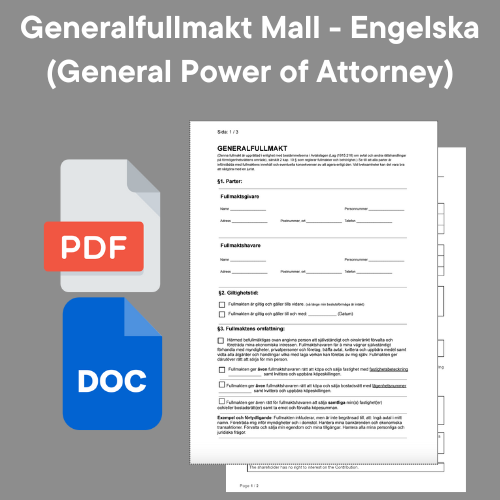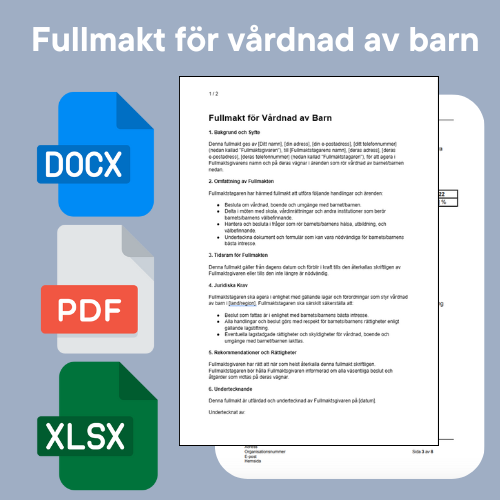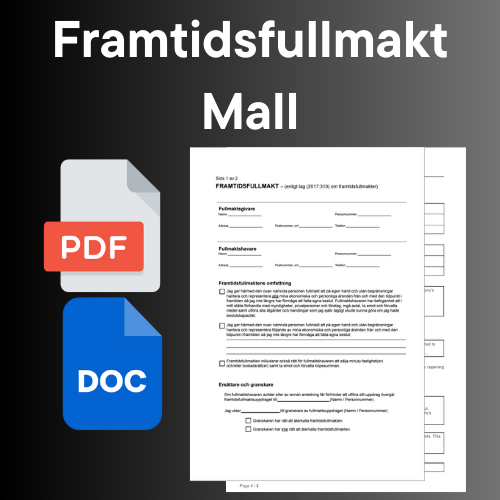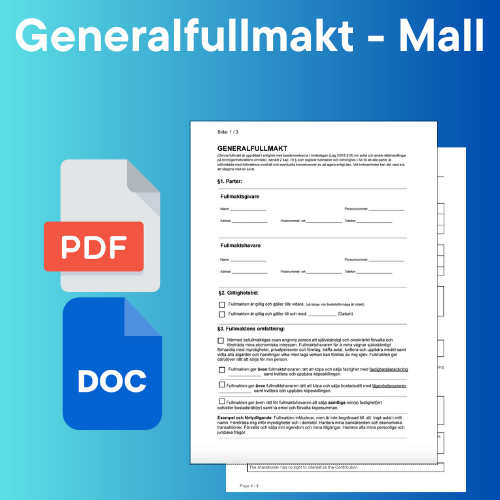Comprehensive Guide on Powers of Attorney
Share
Comprehensive Guide on Powers of Attorney
Table of Contents
- What is a Power of Attorney?
- Why is a Power of Attorney needed?
- Different Types of Powers of Attorney
- How to Write a Power of Attorney
- What does the law say?
- Power of Attorney Apoteket
- Power of Attorney Bank
- Power of attorney Estate
- Power of attorney Relative
- Common questions
- Common Mistakes
- Summary
What is a Power of Attorney?
A power of attorney is a legal document that gives one person (the power of attorney) the right to act on behalf of another person (the power of attorney). The power of attorney can be used for a variety of purposes, from picking up medicine at the pharmacy to handling banking matters or representing someone in legal matters. Powers of attorney are important to ensure that actions are carried out in accordance with the wishes of the person giving the power of attorney when he or she cannot be present.
Why is a Power of Attorney needed?
Powers of attorney are needed to formally and legally transfer the right to perform specific actions to someone else. This may be necessary in many situations, such as:
- When the person giving the power of attorney is sick or away.
- To handle financial or legal matters that require special knowledge or access.
- When a person is unable to perform certain actions themselves due to physical or mental incapacity.
Different Types of Powers of Attorney
There are several different types of powers of attorney, each of which has its specific uses. Here are some of the most common:
- General power of attorney: Gives the power of attorney the right to perform all actions that the power of attorney could do himself. This is a very broad power of attorney and should be used with caution.
- Specific power of attorney: Limited to a specific act or matter, such as selling a car or managing a bank account.
- Power of attorney for estate: Used to manage a deceased person's assets and liabilities. The power of attorney can represent the estate in various legal and financial contexts.
- Medical power of attorney: Gives the power of attorney the right to make medical decisions for the power of attorney if the power of attorney is unable to do so himself.
- Power of attorney for pharmacy: Used to pick up prescription medications for someone else.
How to Write a Power of Attorney
To write a power of attorney that is legally binding and effective, you should include the following elements:
- Heading: State that the document is a power of attorney.
- Authorized person's information: Full name, social security number and address.
- Power of attorney information: Full name, social security number and address.
- Specification of Powers: A clear description of what the power holder is entitled to do.
- Validity period: Enter how long the power of attorney is valid, if it is not for an indefinite period.
- Signatures: The signature and date of the person giving the power of attorney. It can also be good to have witnesses who attest to the signature.
What does the law say?
Powers of attorney are regulated by the Contracts Act (1915:218) and other relevant laws depending on the area of use of the power of attorney. According to the law, a power of attorney is binding on both the power of attorney and the power of attorney as long as it is clearly worded and signed. For certain types of powers of attorney, such as those for estates or medical decisions, additional laws and regulations may apply.
Power of Attorney Apoteket
A power of attorney for the pharmacy is used to give someone else the right to pick up prescription medications. This may be necessary if you cannot visit the pharmacy yourself. For the power of attorney to be valid, it must contain:
- The full name and social security number of the person giving the power of attorney and the holder of the power of attorney.
- A clear description of what the power of attorney has the right to do.
- The signature and date of the person giving the power of attorney.
Many pharmacies have their own templates and systems for managing powers of attorney, so it may be good to check with your pharmacy what is required.
Power of Attorney Bank
A bank power of attorney gives someone else the right to handle your bank affairs. This can include withdrawing money, paying bills or managing investments. Banks often have their own templates and requirements for powers of attorney, so it is important to contact your bank to get correct information.
Bank powers of attorney should be very specific and clear to avoid misuse. They should also have a limited period of validity and specify exactly which accounts and transactions the authorized person has access to.
Power of attorney Estate
A power of attorney is used to give someone the right to manage a deceased person's assets and liabilities. The power of attorney can represent the estate in legal and financial matters, such as paying debts, selling real estate or distributing inheritance.
To be valid, a power of attorney must contain:
- The full name and social security number of the person giving the power of attorney and the holder of the power of attorney.
- A clear description of what the power of attorney has the right to do.
- The signature and date of the person giving the power of attorney.
Power of attorney Relative
A relative's power of attorney gives a close relative or friend the right to act on your behalf to carry out specific tasks. This may include handling medical decisions, banking or other personal matters.
To ensure that a power of attorney for a relative is valid, it should contain all the necessary information and be clearly worded. It can also be useful to have witnesses attest to the signature to strengthen its validity.
Common questions
Here are some frequently asked questions and answers about powers of attorney:
-
How long is a power of attorney valid for?
A power of attorney is valid until it is revoked by the person giving the power of attorney or until the date specified in the power of attorney. Some powers of attorney, such as those for estates, may have specific time frames depending on laws and regulations. -
Can I revoke a power of attorney?
Yes, a power of attorney can revoke a power of attorney at any time as long as he has legal capacity to act. This should be done in writing and communicated to the proxy holder and relevant parties. -
Does a power of attorney need to be witnessed?
It is not always necessary, but having witnesses can strengthen the validity of the power of attorney and reduce the risk of disputes. -
What happens if the authorizer is declared incompetent?
A power of attorney ceases to be valid if the giver of the power of attorney is declared incapacitated, unless the power of attorney expressly states that it shall continue to be valid in such circumstances.
Common Mistakes
Avoid these common mistakes when dealing with powers of attorney:
- Ambiguity: Always be clear about what the power of attorney has the right to do to avoid misunderstandings and potential disputes.
- No time limit: Be sure to specify a validity period for the power of attorney to protect the interests of the power of attorney.
- Incorrect information: Double check that all names, social security numbers and other details are correct.
- No witnessing: Although not always required, witnessing can strengthen the validity of the power of attorney.
Summary
Powers of attorney are important legal tools that enable a person to give someone else the right to act on their behalf. There are many different types of powers of attorney, each with their specific uses and requirements. By understanding what a power of attorney is, why it is needed, and how to write an effective power of attorney, you can ensure that your wishes and needs are properly represented.
It is also important to be aware of the legal aspects of powers of attorney and to avoid common mistakes. By following best practices and advice from legal experts, you can use powers of attorney in a way that protects both your interests and those of the power of attorney.




